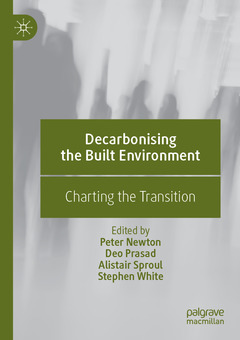Decarbonising the Built Environment, 1st ed. 2019 Charting the Transition
Langue : Anglais
Coordonnateurs : Newton Peter, Prasad Deo, Sproul Alistair, White Stephen

This book focuses on the challenge that Australia faces in transitioning to renewable energy and regenerating its cities via a transformation of its built environment. Both are necessary conditions for low carbon living in the 21st century. This is a global challenge represented by the United Nation?s Sustainable Development Goals and the IPCC?s Climate Change program and its focus on mitigation and adaptation. All nations must make significant contributions to this transformation. This book highlights the new knowledge and innovation that has emerged from research projects undertaken in the Co-operative Research Centre for Low Carbon Living between 2012 and 2019 ? an initiative of the Australian Government?s Department of Industry, Science and Technology that is tasked with responding to the UN challenges. Four principal transition pathways were central to the CRC and provide the thematic structure to this volume. They focus on technology, buildings, precinct and city design, and human behaviour ? and their interactions.
1. Pathways to Low Carbon Living.- Part 1: Energy Transition2. Energy futures for Australia.- 3. Rooftop photovoltaics: distributed renewable energy and storage (or low cost PV changes everything).- 4. Community owned renewable energy: enabling the transition towards renewable energy?.- 5. Unlocking the benefits of vehicle electrification.- 6. Decarbonising household energy use: the smart meter revolution and beyond.- Part 2: Transition to Zero Carbon Buildings.- 7. Assessing embodied greenhouse gas emissions in the built environment.- 8. Transitioning to net zero energy homes: learnings from the CRC’s high performance housing Living Laboratories.- 9. Decarbonising commercial buildings.- 10. The trajectory to a net zero emission built environment: the role of policy and regulation.- Part 3: Regenerating Urban Precincts and Cities.- 11. Sustainable precincts: transforming Australian cities one neighbourhood at a time.- 12. Development of low carbon urban forms: concepts, tools andscenarios.- 13. Health and the compact city.- 14. Low carbon urban mobility.- 15. Integrated urban water systems.- 16. Energy benchmarking for efficient, lower carbon wastewater treatment operations in Australia.- 17. Toward low carbon urban metabolism: the impact of eliminating food waste.- 18. Urban heat island mitigation for overheating and local climate change.- 19. Performance of urban precincts: towards integrated assessment.- Part 4: Human Factors in Low Carbon Living.- 20. Consumer responses to rating tools and residential energy efficiency disclosure.- 21. The Low Carbon Readiness Index.- 22. A social psychological guide for transformation into low carbon living.- 23. Shifting domestic energy consumption through a holistic understanding of the home system of practice.- 24. Engaging home renovators: opportunities and challenges for low carbon living.- 25. Sharing advice online: lessons for fostering sustainable homes from online discussion.- 26. Engaging local communities.- Part 5: A Future Perspective.- 27. Visions scenarios and pathways for rapid decarbonisation of Australian cities by 2040.
Peter Newton, PhD FASSA, is Research Professor in the Centre for Urban Transitions, Swinburne University of Technology, Melbourne.
Deo Prasad, PhD AO FTSE, is Scientia Professor at the University of New South Wales, Sydney.
Alistair Sproul, PhD, is Professor and Head of School of Photovaltaic and Renewable Energy Engineering, University of New South Wales, Sydney.
Stephen White, PhD, is Energy Efficiency Domain Leader in the Commonwealth Scientific & Industrial Research Organisation in Australia.
Identifies innovative and effective pathways for decarbonising the built environment from applied research undertaken by the Co-Operative Research Centre for Low Carbon Living Addresses three grand socio-technical challenges: transition to renewable energy, transition to low carbon built environment and transition to low carbon human behavior – and their interrelationships Identifies the most prospective opportunities for change in how cities and their built environments are designed, built and operated and where activities and behaviours of governments, businesses and residents need to change to radically reduce carbon and ecological footprints and reverse global warming
Date de parution : 08-2020
Ouvrage de 555 p.
14.8x21 cm
Date de parution : 06-2019
Ouvrage de 555 p.
14.8x21 cm
Thème de Decarbonising the Built Environment :
© 2024 LAVOISIER S.A.S.
